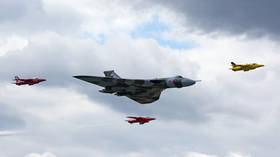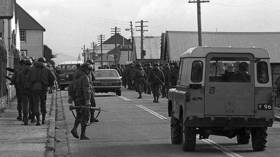Secret UK plan for Falklands War revealed

The UK considered bombing targets in Argentina during the war for the Falkland Islands in 1982, documents in the British National Archive have shown. If given the go-ahead, the sortie would have broken a distance record for a bombing raid already held by the Royal Air Force (RAF).
The plan prepared by the RAF outlined several options for deploying a sole Avro Vulcan bomber from an air base on Ascension Island, flying it to southern Argentina, striking the designated targets, before returning to British soil.
Details of the proposed mission were unveiled in the latest issue of The Aviation Historian quarterly magazine, which was published on Saturday. The Daily Telegraph printed an account of the story on the same day.
The plan was concocted as the RAF was already conducting the longest-range bombing campaign in world history, called Operation Black Buck, which targeted Argentine positions in the Falklands. However, London considered upping the ante in the conflict by attacking targets in Argentina proper.
Three possible routes of approach and return were proposed, complete with refueling schedules for the bomber. The warplane was designed for medium-range missions in Europe, so its use in the Black Buck raids required refueling in midair multiple times, thus posing a logistical challenge.
Of the three paths considered, the longest one was actually the simplest. After attacking Argentina, the bomber would have gone back to the UK via Easter Island, Tahiti, Hawaii, the mainland US, and Canada.
The two other options would have had the Vulcan fly back to Ascension Island, with several additional midair refuelings. The shortest route would have required 13 air tankers to support the mission. However, these tankers were already needed for Britain’s anti-submarine patrols, adding more complexity to the situation.
The military value of such an operation, as well as its legal and diplomatic ramifications, was the subject of debate within the government of Prime Minister Margaret Thatcher.
“It would have been extremely hazardous, required a lot of aircraft and might not have achieved very much,” Sir Lawrence Freedman, the official historian of the Falklands campaign, told The Telegraph.
Before the plan could be put into motion, however, the sixth Black Buck raid had occurred. During the June 3 mission, the Vulcan bomber failed to deploy one of the four anti-radar Shrike missiles it carried but could not jettison it either.
It also broke its refueling probe and had to make an emergency landing in Rio de Janeiro, placing the aircraft and its classified weapon, which had been secretly provided by the US, in the hands of the Brazilian military junta. It took days of wrangling by London and Washington to secure the release of the plane and the crew without a diplomatic incident.
The 74-day Falklands War ended with Argentina ceding defeat. The conflict claimed the lives of hundreds of servicemen on both sides. The effect of the British bombing raids on the outcome remains in dispute.













